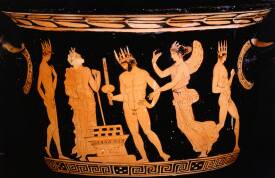| Olympia | Games | Events & athletes | Background | Impact |
 Greek sport cannot be separated from Greek religion. The two domains were connected in many ways.
Greek sport cannot be separated from Greek religion. The two domains were connected in many ways.
Sports contests always took place in the context of a religious festival in honour of a god and near a sanctuary. The origin of the contests was also explained by the intervention of gods and mythical heroes. The Olympic games lasted five days, but only on two days there were contests. On the first day, the athletes and the hellanodikai swore not to offend the rules in a solemn oath to Zeus. On the third day, the climax of the festival, the contests gave way to a large sacrifice to Zeus. Participation in this sacrifice was the most important task of the representatives of other cities who travelled to the sanctuary.
Also the success of the athletes was connected to the favour of the gods. Therefore, victors dedicated their victory crown in the temple of the city god at their homecoming. Pindar traced the descent of the celebrated athletes back to a god or hero. Some fifth-century athletes, such as Theagenes of Thasos, even received the status of demi-god or hero after their death.
 The gymnasion, where professionals and amateurs trained, was also linked to cult. Every gymnasion was dedicated to one or more gods, mostly Herakles, Hermes or Apollo, who had an altar there. The contests held in the gymnasion were also in honour of these gods.
The gymnasion, where professionals and amateurs trained, was also linked to cult. Every gymnasion was dedicated to one or more gods, mostly Herakles, Hermes or Apollo, who had an altar there. The contests held in the gymnasion were also in honour of these gods.
In late Antiquity more and more people converted to Christianity. Under Christian influence, the religious character of the games faded away, for from the 340's onwards pagan animal sacrifices were no longer allowed. The end of the games was only indirectly linked to this evolution, however.